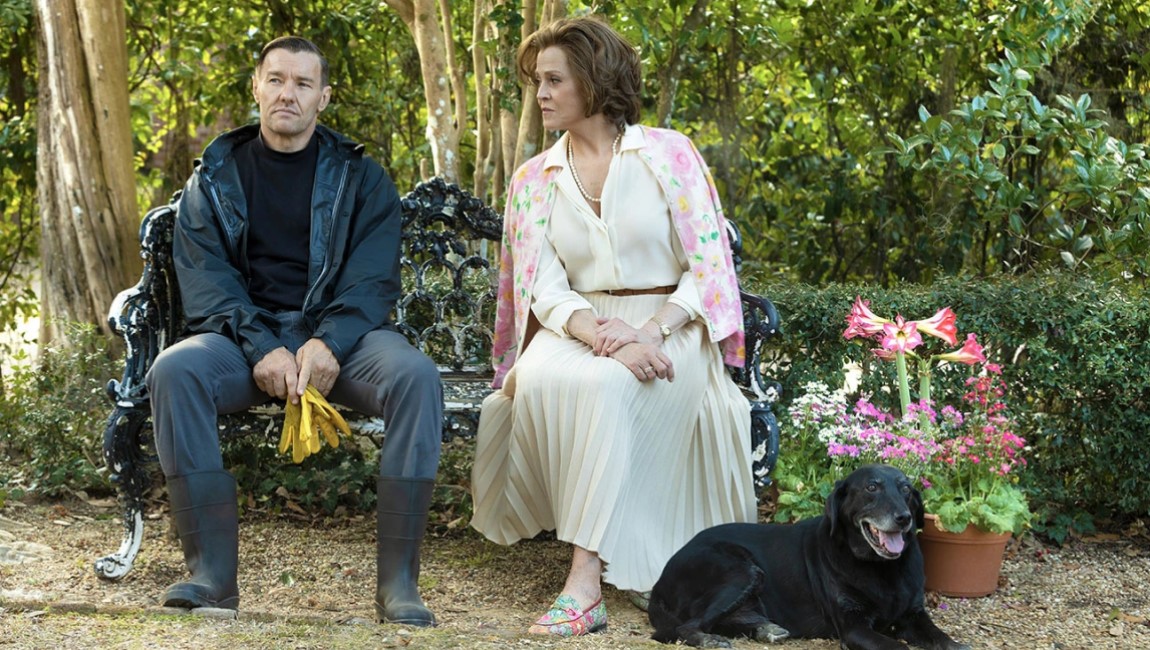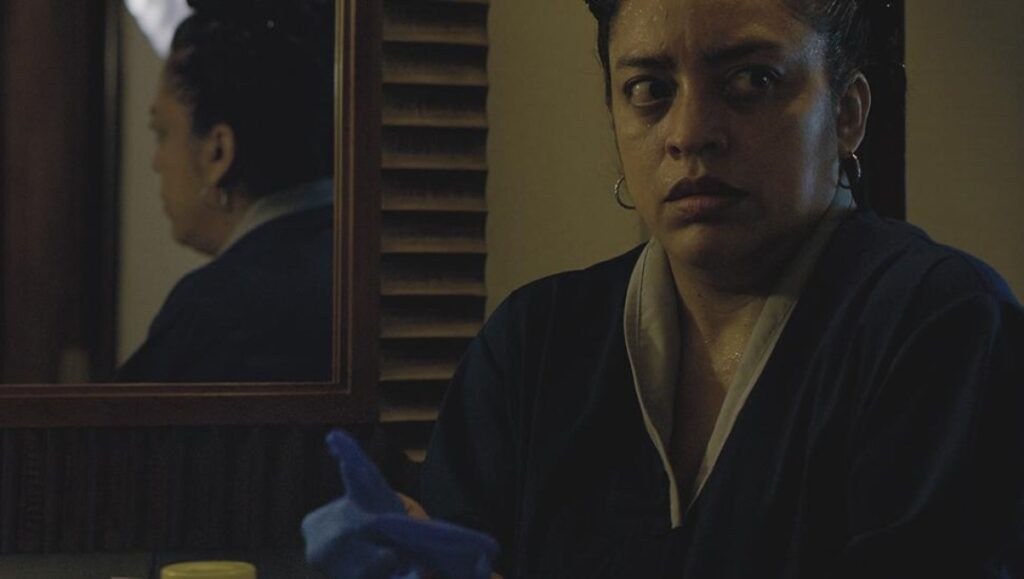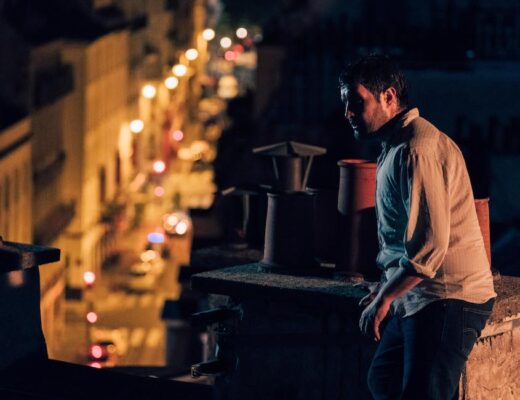Master Gardener
In hindsight, Paul Schrader’s career has been a repeated jettisoning and reappropriation of extraneous artiness, new off-kilter filmic shapes of inscrutable quality emerging at an otherwise reliable clip, especially this past decade. 2017’s First Reformed, something of a critical watershed, is the ostensible perfect result of this equation, yet its academy-ratioed bleakness, Bergman transpositions, and A24 distribution gave it a whiff of authority that other Schrader films before (and after) have wisely refused. Last year’s The Card Counter, and now Master Gardener, share a common, plastic stiltedness with 2013’s wrongly maligned The Canyons, and are the closest the director has come to replicating the remarkable purity of his greatest film, 1992’s Light Sleeper, where a suffocating mix of reprehensibility and plain stupidity on the part of the characters peaks, and then gradually evaporates.
The sequencing of events that engender these shifts vary from film to film, Schrader’s handful of motifs attracting innumerable reactions as they reposition themselves. Master Gardener attaches its loose system of lonely, spiritual reformees, protégées, and exploitative overseers to a newly expressed purview from a director who assumed he wouldn’t live as long as he has: “I used to be an artist who never wanted to leave this world without saying fuck you, and now I’m an artist who never wants to leave this world without saying I love you.”
The Man in the Room this time around is the wildly named Narvel Roth (Joel Edgerton), who, rather than enact a routine that hollows him out, à la Light Sleeper or The Card Counter, is instead ensconced within Louisiana’s Gracewood Gardens, the eponymous horticulturist under the auspices of dowager Norma Havervill (Sigourney Weaver). Schrader has before allowed the diaries of his protagonists to circle the drain with acknowledgedly bullshit philosophy, and Narvel’s musings are no different, save for the fact that they have a strong undergirding of gardening science and history. The aimlessness has already been rectified, and even in the resulting asceticism, the stakes are still high. An ex-white supremacist who’s arrived at this vocation at the behest of witness protection, Narvel only superficially atones for his past — conveyed with queasily quickfire snatches of strung-out violence — staring at his sundry offensible tattoos at night, which are otherwise hidden under turtlenecks by day.
Becoming a mentor to Norma’s grand-niece, Maya (Quintessa Swindell), Narvel feels a burgeoning kinship with the young woman, whose covert drug habit he nevertheless recognizes, himself once being an addict. She’s also ensnared in an on-and-off relationship with an abusive dealer, a system of exploitation that draws out his own repressed agony, clearly tiring of being a sexual curiosity to Norma, as well as adhering to a regimented self-punishment that benefits only him. Schrader’s methods of narrative contextualization are expressionistic — distorted angles and bludgeoning montage — and thus, the conflation of past and present merely depict in lieu of explaining, so that Master Gardener isn’t some American History X-esque, “both-sides” polemic, but a study of protracted aftermath, and the dormancy of sin. When Maya lifts Narvel’s shirt, the tattoos are briefly glimpsed as if menacing portents for the climax of a more shallow film; he promptly pulls the fabric back down and runs from her, pawing at the inked spots of his body as if they were bee stings.
Schrader’s recent penchant for unblemished digital catalogs all these loaded interactions with an unnerving clarity, and the film itself is largely made up of markedly depopulated two-shots, the hotels and diners even emptier than those in The Card Counter. That pesky Ozu influence actually has one of its more viable manifestations, empty chairs often arranged on a perfectly diagonal axis, a rigorously maintained minutiae that makes do with only a few elements. Some of the steadier members of the Schrader corpus belong to Master Gardener, but the characteristic desperation is still registered physically, in extreme long shots that isolate figures within unnerving symmetry, and Steadicam work that is as invasive as it is spectral. This visual assuredness, more skeletal than ever, mirrors the adopted monasticism, and as the façade suffers hair-slivers, the cuts begin to fall out of any sort of traceable rhythm, and the camera probes more, like the quite distressing scene in which Narvel and Maya drive in circles around her apartment to avoid her abusers, who are just around the corner, a surveillance-like angle sustained from the back of the pickup.
The curious thing about every new Schrader film is the anticipation of its violent and momentary deluge, though he nowhere near resembles an action director. He’s obsessed with circumstantial bloodshed, which achieves a religiosity that is otherwise thought impossible in his extremely secular filmic worlds. He spares judgment on whether or not these acts constitute the much-desired redemption, urging us to look backward in a film whose preceding two acts played as ancillary on first blush. The real climax is a dream of unspecified ownership, where a nighttime highway is suddenly in endearingly pixelated bloom, an obvious metaphor made paradoxically tangible by its overt digitalness. As he does with his characters, Schrader empties out his films so that only platitudes remain — but what an affecting example of the moral void that continues to be.
Writer: Patrick Preziosi
When the Waves Are Gone
In an interview with Michael Guarneri, Lav Diaz states quite emphatically that “tragedy and suffering are an inherent part of man’s existence and death is inescapable. Only truth is regenerating and liberating, if you can find it and accept it.” There’s arguably no one doing more right now to confront authoritarianism in their art than Diaz, who has been mercilessly critiquing Filipino president Rodrigo Duterte for years. Duterte has supposedly retired from politics, but recently elected president Ferdinand Marcos, Jr., son of infamous dictator Ferdinand Marcos, suggests there is still plenty of work to be done combating fascist nationalists. While Diaz’s 2019 film The Halt imagined a futuristic, dystopian version of Manila, When the Waves Are Gone eschews that film’s crypto-sci-fi trappings to delve headlong into the extra-judicial police killings that came with Duterte’s so-called “war on drugs.” As usual with Diaz, a simple plot synopsis doesn’t really get at what actually makes his long, enveloping films unique, that overpowering sense of cinematic time becoming unmoored and moving independently of the character or story that it possesses. While the Venice Festival description says flatly that When the Waves Are Gone is an adaptation of Dumas’ The Count of Monte Cristo, that source material is at best merely a jumping-off point (much like the opaque connections between Crime & Punishment and Norte, the End of History).
Introduced as the police force’s greatest investigator, Lt. Hermès Papauran (John Lloyd Cruz) teaches classes at the police academy while simultaneously spending his nights tracking down his wife’s lover. He finds them together and violently confronts them, only to be called out as a wife beater back at work. In a fit of rage, he then attacks the fellow officer who dared make the incriminating remarks, then abruptly quits the force in an act of contrition. Concurrently, Primo Macabantay (Ronnie Lazaro) is released from prison and sets about finding Hermès, the officer responsible for putting him behind bars. In the meantime, Hermès confers with his friend Raffy Lerma (DMs Boongaling), a photojournalist who has documented an untold number of murders by both police and vigilantes looking to enforce zero-tolerance drug policies. Stricken with an increasingly serious case of psoriasis, Hermès returns to his ancestral home and tries to patch things up with his estranged sister, Narissa Papauran (Shamaine Centenera-Buencamino), while an increasingly unhinged Primo prowls the city at night preaching the gospel to sex-workers and looking to baptize them.
In his book Sculpting in Time, Tarkovsky pontificates on the idea of “art making infinity tangible.” Diaz is after something similar, his “slow” (an awful word) cinema allowing for the full weight of history to press down upon his characters. Diaz links the literal decay of Hermès’ body to his moral decay, while simultaneously casting the conflict between Hermes and Primo as a synecdoche for the whole of Filipino society. In other hands, this would be an intolerably blunt, ham-fisted metaphor. But Diaz allows it to play out on this epic yet intimate canvas, where it becomes a kind of primal howl of rage against the world. As is typical for Diaz, the camera is largely static, each scene playing out in long, fixed takes, usually perched at a slight god’s eye view (if Ford was a great director of ceilings, Diaz does the same for floors). A wide-angle lens creates plenty of depth of field, as characters traverse city streets or long stretches of beach in what feels like real time. There’s no cross-cutting here; instead, Diaz devotes long chunks of narrative time to each character. Primo isn’t even introduced until almost 40 minutes into the film (out of a three-hour runtime; practically a short by Diaz’s standards).
After a long period of working as his own director of photography, Diaz has reunited with collaborator Larry Manda, the cinematographer of Norte, Season of the Devil, and others. Shooting on Super 16mm film instead of digital, When the Waves Are Gone has a somewhat softer black and white than Diaz’s other recent work, which leaned toward high contrast, blown-out whites, and those stark but fuzzy highlights that digital tends to favor. Film gives more gradations to the images, a nice grayscale that adds depth and volume. It’s a great-looking film, and the reduced runtime and simple genre hook might make this an ideal introduction to Diaz for the uninitiated. For longtime fans, it comes across as a little slight, if still quite worthwhile. But whatever its flaws, Hermès’ and Primo’s final confrontation suggests a grappling with a violent past in an effort to grasp at some sort of truth. These men gaze into the dark abyss of the modern world and willingly jump into the void. Diaz suggests that they deserve it.
Writer: Daniel Gorman
Luxembourg, Luxembourg
It’s the pillowing warmth of nostalgia, which sporadically rears its head that it may provide orientation and affirm consciousness amidst historical chaos, that makes up the body of Antonio Lukich’s sophomore feature. Luxembourg, Luxembourg is a romantic ache in the tale of twins Kolya and Vasylii (Amil and Ramil Nasirov), whose lives play foil for one another as they reconvene upon receiving the news that their estranged father is dying in the eponymous country, a far-of journey from their native Ukraine. Lukich sees opportunity to delve into the familiar pinnings of a road movie (the genre of his debut feature, My Thoughts Are Silent) and therein seeks active subversion; instead, much of this opportunity is wasted, and the film languishes by and large in the stagnancy of the brothers’ daily frustrations and rose-tinted memories. What crystallizes is a discordant relationship between characterization and narrativization, as Lukich staggers the film with confrontations in the life of Kolya, the true protagonist who narrates his dreams, desires, and recollections as bookends to an aimless tale. To that end, Luxembourg, Luxembourg appears to want to conceive an emancipatory journey that seeks self-actualization, divorced finally from those coercive visions of a false past. These very visions find stock in their formal flourish, taking on the sensibilities of Scorsese in their montage. The emulations are peppered throughout the film, at random and, always, daringly superficial. There lacks in every joint of Lukich’s narrative a coherent relationship between its impromptu pieces which coalesce into not much more than a confounding collection of disparate sentiments, mediating between the filmmaker and his own fragmented memories.
Our characters, in each new step, are shirked by circumstance, their anticipation unyieldingly disappointed, the lies always unveiling themselves just as a smile might conjure on a face. These machinations reek of Euro-miserablism, siphoned through tonal indecision. Lukich positions himself at a great distance from his characters, and consequently so are we. Luxembourg, Luxembourg’s third act is upended by an expositional phone call just minutes prior to its denouement, a phone call which informs us of certain ulterior motives existing within this wandering plot. With such lack of organization, it’s a small miracle how emotion might be construed, much less come to the fore. All that’s really present, beneath the surface, are meager tropes to help guide Lukich through a reckoning with his own patriarchal relationships: his camera, his characters, his narratives all bungled by this narrowing of perspective, flattening out every faculty of his work into the simplistic association of unambiguous contrast. The brothers, in their individual ways, seek the vitality of life: Kolya in the fantasies of his father, Vasylii in the aspirational success of careerism (a cop looking to become a detective). Through deeply contrived means, they find themselves at the same platitudinous cliché: their longing for something is, in perpetuity, at odds with their capacity to grasp hold of the material world around them. The brothers create a fiction of their own predilection, only to be burdened by inevitable disillusionment; Lukich leaves us with this, a trite conception of material/psychoanalytic relations with not much more to contemplate.
Writer: Zachary Goldkind
Camarera De Piso
Camarera de piso — Lucrecia Martel’s latest short, commissioned as part of The National Autonomous University of Mexico’s Síntesis project — comes with a curious director’s statement: “I had been proposed to find ways to relate contemporary dance with audiovisual language.” While the specifics of what’s being referenced could be chalked up to a translation issue, or one where little context was provided in the first place, this implies that the events that occur during the 15-minute runtime should be, first and foremost, scrutinized on the basis of their physical movements and how they relate to the filmic diegesis around them. And indeed, there is a strong corporeal presence here, one that’s only intensified by how committed Martel is to drawing out said resident’s largely offscreen misery. A woman, training to be a housemaid, continuously receives phone calls from her family about an incoming danger that’s soon to arrive at their doorstep; the unnamed hazard, much like the vagueness of the central character, is ambiguous for its own sake, a plot device that implies that looming danger always lies in the periphery. When the woman’s phone rings, she’s immediately reprimanded by her supervisor and reminded to put all personal items in her locker; the soon-to-be-maid refuses to listen, instead choosing to pick up every time. The calls and their hurried words begin to seep outside into the film’s audio mix itself, where even when the maid’s not on the phone, she’s still haunted by their voices, whispering sullen words about their possible fates.
Which, considering all of those real-world specifics that come with this basic premise (and some rather hefty sociopolitical implications as well), this is a bit of an odd thing to so casually label a “dance,” no? Or, put it another way: considering the starting concept — essentially a play on sound/image theory — how did Martel find her way here other than by pure coincidence (though, happenstance doesn’t seem too likely) or by truly believing there was some connective tissue between the base idea and the complete work? The former would be acceptable, if completely naive as well; the former speaks to how misguided the piece’s intentions feel, even from the jump. As an intellectual practice, this is peak sadism under the guise of humanism. It’s hard to clearly say which is the more disgusting image: either the nameless maid being cussed out with her face cut out of the frame, or with it in the frame but troubled by a look of feeble defeat that makes all of this relatively worthless.
Writer: Paul Attard
Autobiography
Rhetorically, the threatening specter of militarism looms just out of frame in Makbul Mubarak’s debut feature, Autobiography, a work extrapolated from the political and ideological strife the director seems intent on reflecting upon with brooding moral discernment. Literally, in the introductory sequence between our protagonist, the coy Rakib (played by Kevin Ardilova), and his officious employer, the former-general-now-bullish-politician Purna (Arswendy Bening Swara), a large painting of the retiree in-uniform hangs above our hero’s turned head; the former’s fate to be entwined with the soldier, in this moment, now looks sealed. An escalating set of labored machinations lead Rakib down an ethical spiral, obfuscating the usually dialectical territory with an unhelpfully binary philosophizing. Mubarak slathers Rakib in anonymity, which ultimately confounds the work’s focal quandaries — such a foundation of personality, or lack thereof, is both a lazy character trope and, perhaps in this case, an assumptive one. As a result of the former, the relationship between spectator and character is constantly determined by plotted context, our interpretations rendered merely through Rakim’s proximity to action and never via his own agency as character. Simultaneously, this character’s vacant interiority — a construct of Mubarak’s to seek the answer to the question: “is loyalty still honorable if and when it is pledged to something monstrous?” — surmises an innocuous austerity as the blank slate upon which fanaticism can fester, rather than coloring-in any contradiction which would trouble and make provocative this depiction of finding allure in the promises of fascism. Instead of the active agent taking hold of the reigns of power offered to them as a means towards some sense of actualization, it is the passive vassal who is unaware of what they have gotten themselves into and, therefore, must eventually escape. This is an assumption of disposition that will condemn the work to that of vague idealistic exercise.
The ideology of the film is increasingly drab in reflection of the question Mubarak articulates within the Director’s Statement: “In a society with such a repressed history, what does it take to be able to call oneself ‘a good person’?” The film seems content to find its answers in the naive blurring of liberal moralism, seeking illumination not in the infrastructures of mobility and positionality, which invariably conduct common codes of ethics, but in those very idealistic codes of ethics that by design often fail to ever position themselves within said infrastructure. Mubarak seems less interested in the world that cultivates these relationships of power and their effects than he is in just the individualistic cognition of morality. Unfortunately, organizing such a narrative around a character through which a particular morality has already been cognized and allocated ensures nothing but an extended runtime of redundancy. What we’re left with is the tottered unfurling of reductionism and presumed dramaturgical virtuousness.
Writer: Zachary Goldkind









